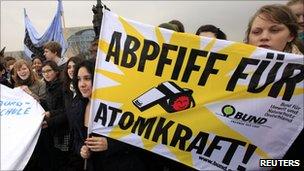Japan disaster: Germany halts nuclear extension plan
- Published

The German government's decision to extend the lives of nuclear plants has aroused deep hostility
Germany has responded to the Japanese nuclear crisis by suspending for three months a plan to extend the lives of its ageing nuclear power stations.
Chancellor Angela Merkel's coalition government announced last year that the country's 17 power stations would close around 12 years later than planned.
The government has faced growing calls for the extension to be scrapped.
The two oldest plants that had been due to shut in the next three months are now likely to be closed after all.
The EU has called an emergency meeting on Tuesday to review safety measures at nuclear reactors across Europe.
the EU said it wanted to assess the Japanese situation and the EU's state of preparedness "in case of similar incidents". It said the aim was to get "first-hand information on contingency plans and safety measures in place".
The Swiss government also announced on Monday that it was suspending its nuclear plans because safety was its first priority.
Switzerland currently has four nuclear plants with five functioning reactors and the country's regulatory authorities have now frozen the regulatory process for a further three sites.
However, Polish Prime Minister Donald Tusk said his country would go ahead with its plans to build two new plants, noting that Poland did not have the same risk of earthquakes as Japan.
Protests
The German decision to suspend the controversial extended life policy for 17 power stations came after growing political pressure.
Tens of thousands of people took part in demonstrations in Germany at the weekend against the Berlin government's nuclear policy.
They formed a 45km (27mile) human chain in the south-western state of Baden-Wuerttemberg from Stuttgart to one of the power plants affected by the nuclear extension policy, at Neckarwestheim.
German voters go to the polls in Baden-Wuerttemberg later this month, and Chancellor Merkel's Christian Democrats are faring badly in opinion polls.
After Chancellor Merkel's announcement on Monday, Environment Minister Norbert Roettgen said two plants that dated back to the mid-1970s would be shut down regardless of whether the extension was renewed in three months' time.
The Biblis A plant will be phased out by the end of May and the Neckarwestheim plant will also close in the coming months.
Senior officials from all of Germany's federal states are due to discuss nuclear issues with the chancellor and top ministers on Tuesday.
- Published12 March 2011